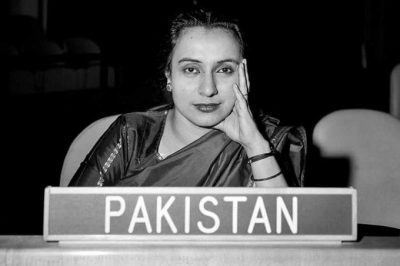Begum Shaista Ikramullah was the first female representative of the first Constituent Assembly of Pakistan. She was born to an intellectual family in Calcutta on July 22, 1915. Her father, Hassan Suhrawardy, studied medicine in Calcutta and England and worked for the East India Railway.
Descended from Mughal landowners, Begum Shaista Ikramullah’s mother embodied a far more traditional background. Inspired by Mohammad Ali Jinnah, Begum Shaista stepped into Politics. Fatima Jinnah recruited Ikramullah to form the Muslim Women’s Student Federation.
She led the Muslim Women Student’s Federation and the All-India Muslim League’s Women’s Sub-Committee. Following the birth of their first son, the family relocated to London, where Begum Shaista Ikramullah pursued studies in journalism and literature.
Political Career
She was a formidable politician, a brilliant diplomat who could navigate any international quagmire, and a writer whose words resonated with depth and insight. After the partition of the Sub-Continent, she migrated to Karachi, West Pakistan (1947). She joined the Constituent Assembly as the first female representative.
During her 7-year legislative career, she made efforts to improve relations between West and East Pakistan and improve Muslim women’s political participation and legal status. Her most important achievement was passing the personal laws in 1951, which guaranteed women full inheritance rights despite fierce opposition from traditionalists.
The Constituent Assembly was dissolved in 1954. She served as Pakistan’s delegate to the United Nations and is known to have shaped the Universal Declaration of Human Rights (1948) along with Eleanor Roosevelt at the United Nations exhibition and her dedication in advocating for Article 16, which stands against child and forced marriages. She also worked for and supported the Convention Against Genocide (1951). Begum Shaista also served as Pakistan’s Ambassador to Morocco from 1964-1967.
Also Read: Kalsoom Brohi – Defiance against Honor Killings
Literary Achievements
Her doctorate thesis titled “A Critical Study of the Development of the Urdu Novel and Short Story” was a critical survey of Urdu literature and earned her the prestige of being the first woman to be awarded a PhD from the University of London.
Her unwavering commitment to supporting women’s rights led her to translate her autobiography, “From Purdah to Parliament” (London, 1963), into Urdu. This decision stemmed from her growing concern that the golden age of women’s struggles and achievements risked fading from the public memory, particularly among ordinary people, because of the language barrier.
Final Years and Legacy
Her impressive list of achievements starkly contrasts the limited recognition she receives in Pakistan. Her life and contributions, particularly towards Pakistani society and women’s empowerment, serve as a powerful inspiration. She blazed a trail in male-dominated fields like politics and diplomacy, setting a groundbreaking example for future generations of Pakistani women.
Begum Shaista Ikramullah passed away on December 11, 2000, in Karachi at 85. In 2002, the President of Pakistan posthumously gave her the highest civil award, the Nishan-i-Imtiaz (Order of Excellence) award.
I am currently pursuing a Bachelor’s degree in International Relations. My areas of interest include Current Affairs, Diplomacy and International Political Economy.







